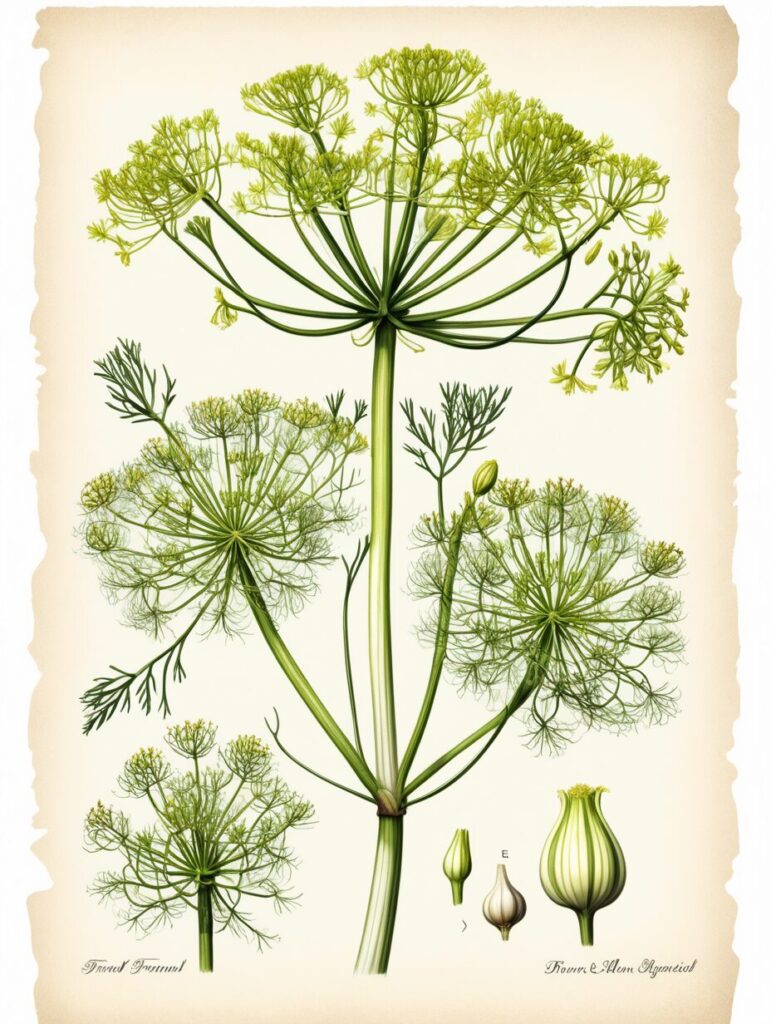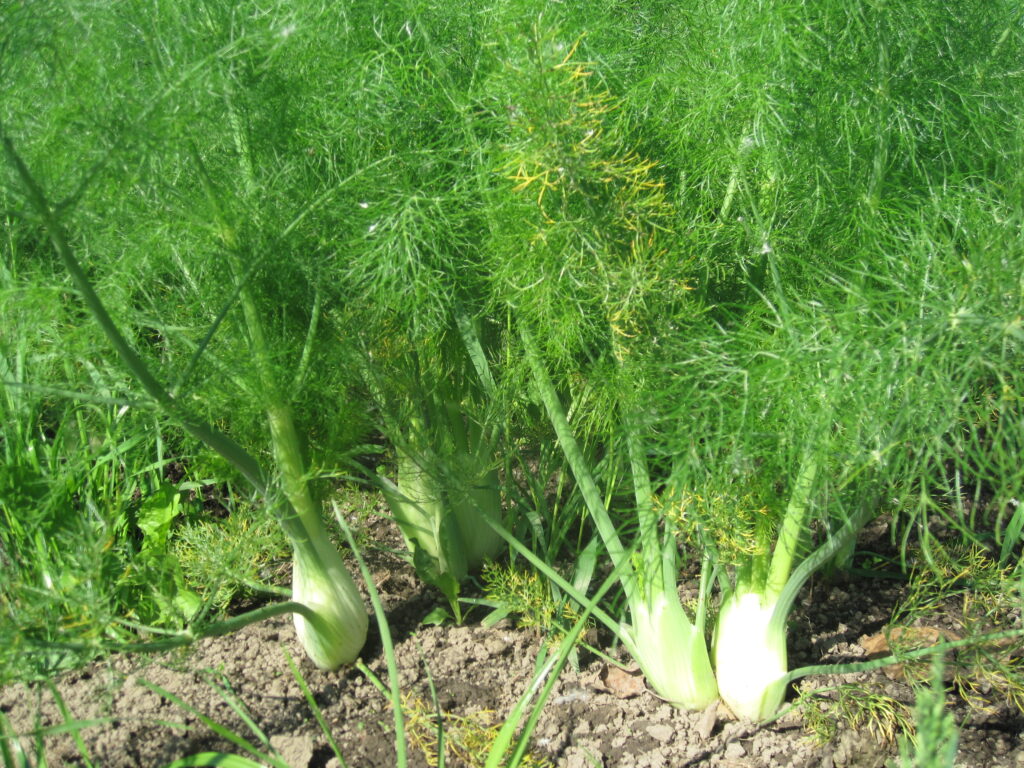ennel, with its delicate, feathery foliage and striking tall stems, stands as a testament to nature’s elegance and versatility. Rooted deeply in rich history and medicinal tradition, fennel has accompanied humans across millennia—from ancient Greek myths to modern kitchens, offering its unique charm and health benefits along the way. The plant, with its mildly sweet, anise-like aroma and flavor, invites us into a world where culinary and medicinal uses blend effortlessly into one.



Originating from the Mediterranean region, fennel is now grown worldwide, celebrated for its rich tapestry of uses. Its name, derived from the Latin word “faeniculum” meaning “little hay,” references its feathery leaves that bring visual softness to a robust, hardy plant. Historically, fennel has been much more than a mere plant. Mythologically, it’s woven into Greek tales, specifically the legend where Prometheus used the hollow fennel stalk to carry fire to humans, symbolizing enlightenment and transformation. In this act, fennel carried the weight of hope and renewal—a fitting metaphor for its role in facilitating human health and wellness.
Fennel’s medicinal applications have been revered across various cultures for centuries. Its seeds, leaves, and bulb each contribute unique benefits. Predominantly, fennel serves as a reliable digestive aid, adept at alleviating common gastrointestinal complaints such as bloating, gas, and indigestion. Its carminative properties soothe the digestive tract, easing discomfort and promoting digestive health. The seeds naturally stimulate the production of gastric enzymes, thus enhancing nutrient absorption and digestion efficiency—a valuable trait for those striving for optimal gut health.
Fennel’s respiratory benefits are equally notable. Acting as an expectorant, fennel can relieve coughs and promote the clearance of mucus from the respiratory system. Its gentle nature makes it suitable for children and adults alike, offering a palatable and comforting remedy in soothing teas.
One of the most acclaimed compounds in fennel is anethole, the primary component responsible for its aromatic flavor. This compound boasts a repertoire of beneficial properties—antioxidant, anti-inflammatory, and antimicrobial. Fennel’s role as an antioxidant contributes to neutralizing harmful free radicals in the body, subsequently reducing inflammation, protecting cells, and potentially lowering the risk of chronic diseases.
Culturally, fennel has been associated with increased focus and endurance, dating back to Roman warriors who would chew the seeds before battles to stave off hunger and maintain energy levels. This appetite-suppressing quality made fennel an ally to those observing fasts or seeking weight management solutions.
Interestingly, fennel’s dynamic flavor and aroma make it an exquisite choice for culinary use. Its seeds flavor everything from breads and teas to more substantial dishes like Italian sausages and pickles. The bulb, sweet and crunchy, elevates salads and roasts with its refreshing texture, while the leaves grace salads and garnishes with a graceful flourish. In terms of taste, fennel can span a spectrum from mildly sweet to slightly bitter, with a floral, earthy undertone that complements a wide variety of dishes.
Further enhancing fennel’s appeal is its nutritional depth. Rich in vitamin C, dietary fiber, and essential minerals like potassium, fennel supports immune function, digestive health, and cardiovascular wellness. Its vitamin B6 content aids metabolic processes, emphasizing fennel’s nutritional significance beyond flavor and fragrance.
From an Ayurvedic perspective, fennel is a tri-dosha balancer, suitable for Vata, Pitta, and Kapha constitutions. It cools Pitta, stimulating digestive heat without overwhelming the fiery dosha. For Vata, fennel’s warming properties stabilize erratic digestive processes, while its digestibility helps Kapha maintain metabolic equilibrium.
In companionship with beneficial soil bacteria like Bacillus megaterium, fennel demonstrates a natural symbiosis that supports plant health and encourages soil richness. This microbial partnership enhances root development and nutrient uptake, playing a vital role in fennel’s robust growth and resilience in various growing conditions.
Planting fennel requires consideration of its natural properties. Since it has allelopathic tendencies, meaning its compounds can inhibit the growth of nearby plants, choosing its companions wisely is crucial. Despite this, fennel can play host to a myriad of beneficial insects, becoming a vibrant component of a healthy garden ecosystem.
Fennel Infused Olive Oil Recipe
Embrace the essence of fennel through a simple, homemade fennel-infused olive oil—perfect for enhancing salads, pastas, or bread dips with an aromatic touch.
Ingredients:
- 1 cup of extra-virgin olive oil
- 2 tablespoons of fennel seeds
Instructions:
- Heat and Infuse: In a small saucepan, combine the extra-virgin olive oil and fennel seeds. Warm gently over low heat for 10-15 minutes to allow the fennel seeds to impart their flavors into the oil. Be cautious not to overheat.
- Cool and Strain: Remove from heat and let the mixture sit to cool completely. Once it has reached room temperature, strain the oil through a fine-mesh sieve or cheesecloth to remove seeds.
- Store: Pour the infused oil into a sterilized glass jar or bottle. Store in a cool, dark place and use within a few weeks to enjoy the fresh flavors at their peak.
Through its nurturing presence, fennel offers more than seasoning or solace. It is a symbol of transformation and tenacity, urging us to find balance amidst life’s unpredictable landscape. In the graceful fronds of fennel’s essence, we find a guide to wellness—inviting resilience, empowerment, and a zest for the flavors of life.




